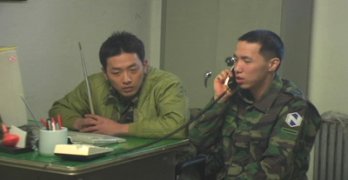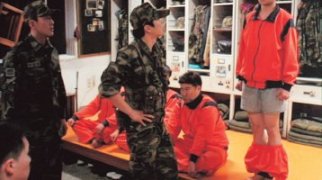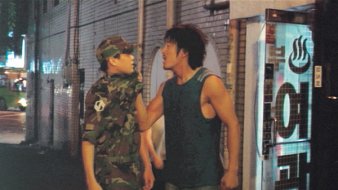A Short Interview with Yoon Jong-bin
by Paolo Bertolin

Yoon Jong-bin emerged as the most celebrated young director at the 10th Pusan International Film Festival. His debut feature The Unforgiven received accolades from press and audiences alike, and ended up collecting no fewer than four awards, namely a special mention from the official jury, the FIPRESCI award, the NETPAC award and the PSB Public Prize. This independent production had raised advanced interest for its controversial subject matter, namely the authoritarian climate of psychological and physical violence during the 26 months (recently reduced to 24) of Korea's mandatory military service. Yoon's film, however, eschews easy sensationalism by adopting a dry presentation close to a documentary approach, while the narrative parallels events in the present and recent past, keeping the viewer's interest vigilant. A graduate of Seoul Chung-Ang University (he received his diploma in February) the 26-year-old Yoon talked with us on the eve of the PIFF awards ceremony.
How did you manage to finance a project that tackles sensitive issues regarding the institution of the military in Korea?
 My short film Identification of a Man had won a prize at the Mise-en-Scene's Genres Film Festival, sponsored by Mise-en-scene cosmetics, in the King of Comedy category. The prize money consisted of five million won (approx. US$5,000). My project was then chosen among the five independent productions that the Korean Film Council (KOFIC) supports each year, providing the equivalent of US$10,000. My mother put up the rest... However, since we had a shoestring budget of about twenty million won (US$20,000) neither the two leads nor myself received any compensation. Concerning the issues about the military, we had to submit a fake screenplay to the Ministry of Defense in order to obtain the authorization to shoot in real army barracks.
My short film Identification of a Man had won a prize at the Mise-en-Scene's Genres Film Festival, sponsored by Mise-en-scene cosmetics, in the King of Comedy category. The prize money consisted of five million won (approx. US$5,000). My project was then chosen among the five independent productions that the Korean Film Council (KOFIC) supports each year, providing the equivalent of US$10,000. My mother put up the rest... However, since we had a shoestring budget of about twenty million won (US$20,000) neither the two leads nor myself received any compensation. Concerning the issues about the military, we had to submit a fake screenplay to the Ministry of Defense in order to obtain the authorization to shoot in real army barracks.
What was the starting point for the film? How did you develop the script?
The starting point was my personal experience. If you are born a male in Korea, going to the military is not a choice but a duty. Once they complete the military, Korean men usually don't talk much about their experiences. If they do so, it's just to tell funny stories or to brag about some exaggerated episodes. I instead thought that this was an important subject to deal with in Korean society. The military experience is one that pushes us to have a taste of both the role of the victim and the oppressor. Once we are discharged, we all tend to justify ourselves by considering our behavior as dictated by the military lifestyle and system.
When developing the script I tried to conceive of the film as a mystery where the truth is slowly uncovered. This was for the purpose of keeping the audience's interest.
The film seems to suggest a homoerotic attraction of the character of Seung-young towards the other protagonist, Tae-jung. Although this is never fully developed, one has the feeling that Tae-jung's uneasiness when meeting Seung-young after being discharged might be related to the inappropriateness of their closeness and bond in civilian life.
 Yes, I intended to suggest the possibility of Seung-young's attraction towards Tae-jung. Yet, what mattered to me most about Seung-young was his fragility, his emotional dependency on Tae-jung, and ultimately his inadequacy for military life. From Tae-jung's point of view, instead, Seung-young represents an obstacle to his readjusting to civilian life, as his sheer presence brings back memories that Tae-jung wants to erase. And it is also true that excessive proximity between males in everyday life could be regarded as inappropriate. In general, Koreans don't keep in touch with their mates from the military. Reunions with fellows in the military where you go out eating or drinking might actually occur, if not that frequently. But even if people accept the invitation, inside they are usually are not so willing.
Yes, I intended to suggest the possibility of Seung-young's attraction towards Tae-jung. Yet, what mattered to me most about Seung-young was his fragility, his emotional dependency on Tae-jung, and ultimately his inadequacy for military life. From Tae-jung's point of view, instead, Seung-young represents an obstacle to his readjusting to civilian life, as his sheer presence brings back memories that Tae-jung wants to erase. And it is also true that excessive proximity between males in everyday life could be regarded as inappropriate. In general, Koreans don't keep in touch with their mates from the military. Reunions with fellows in the military where you go out eating or drinking might actually occur, if not that frequently. But even if people accept the invitation, inside they are usually are not so willing.
What was the main idea about South Korea's military service that you wanted to convey through The Unforgiven?
I mostly wanted to present how the system works and how it reproduces itself. When you start your military service, you are on the lowest level of the hierarchy and you have to obey all your superiors. Officers may be very harsh and authoritarian. With the passing of time, however, seniority results in a climb up the hierarchical ladder and you start to have people obeying your orders. Many people think that when they become senior officers they will not behave as their superiors did, but eventually the system leads us all to behave in the same way. I wanted to highlight this coexistence of responsibility of both individuals and the system. The character of Seung-young is meant to demonstrate that the efforts of single well-intentioned individuals are systematically doomed to fail. This is something many of us have felt.
Paolo Bertolin, PUSAN October 2005